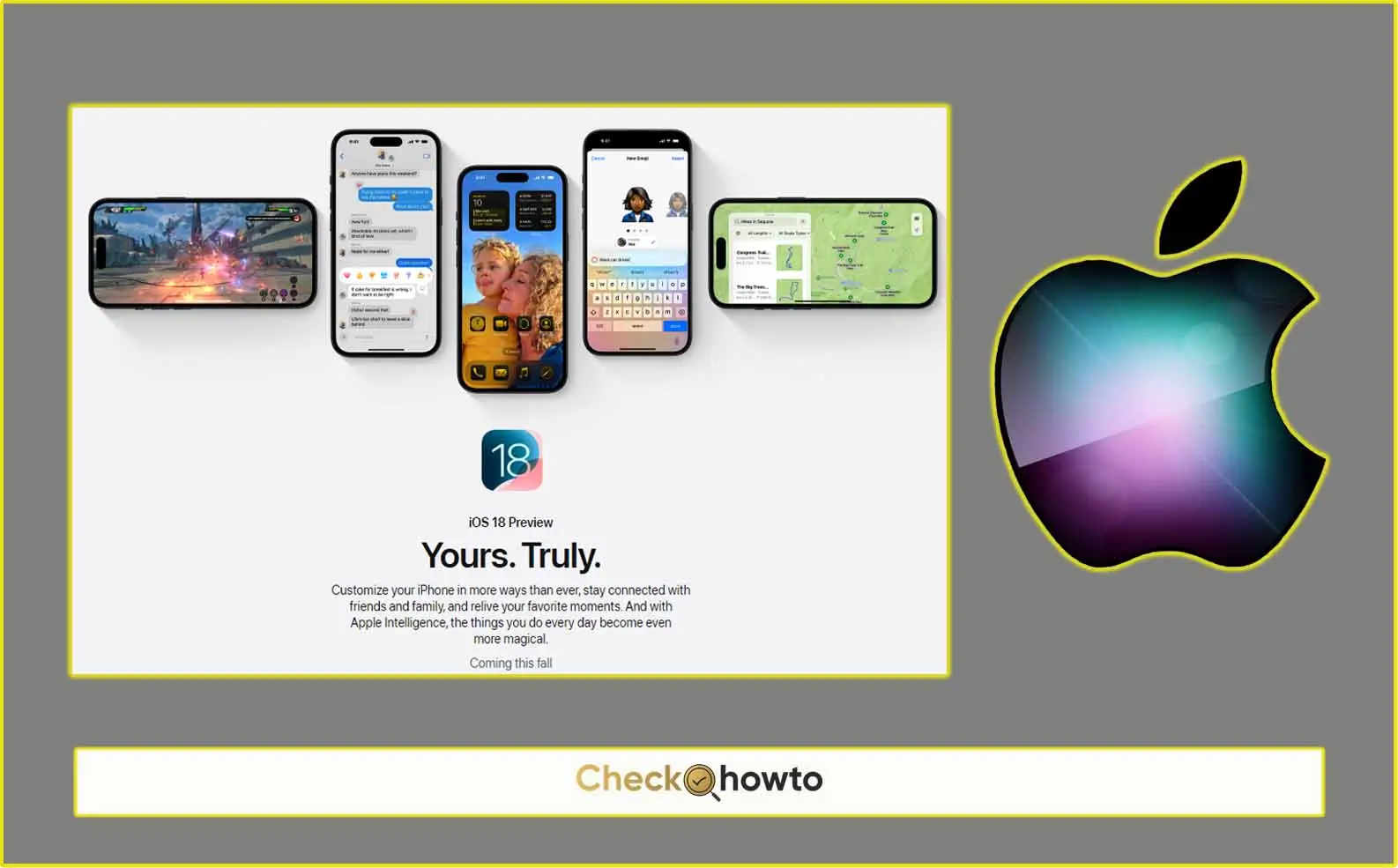As an iPhone user, staying up-to-date with the latest software is crucial. Not only does iOS 18 promise exciting new features, but it also ensures you have the most recent security patches and bug fixes. But with each new iteration, a common question arises: will my iPhone be compatible? In this comprehensive guide, I’ll break down everything you need to know about iOS 18 compatibility and help you determine if your device is eligible for the upgrade.

Understanding iOS 18 Compatibility
Apple strategically designs its software updates to work seamlessly with a range of devices. However, there’s a limit to how far back compatibility can extend. iOS 18 adheres to this principle, focusing on iPhones that possess the processing power and hardware necessary to run the new features effectively.
The Good News: A Wide Range of Supported Devices
This year, there’s good news for iPhone users! Apple has maintained a generous support window for iOS 18 on different iPhones. Here’s a breakdown of the iPhones that will be eligible for the update:
- iPhone 15 Series: This includes the iPhone 15, 15 Plus, 15 Pro, and 15 Pro Max. These top-of-the-line models boast the latest A17 Bionic chip, ensuring smooth performance with iOS 18.
- iPhone 14 Series: The iPhone 14, 14 Plus, 14 Pro, and 14 Pro Max are also compatible. These devices, equipped with the A16 Bionic chip, offer ample power to handle iOS 18’s demands.
- iPhone 13 Series: The iPhone 13, 13 mini, 13 Pro, and 13 Pro Max remain supported. Their A15 Bionic chip continues to be a powerhouse, making them well-suited for iOS 18.
- iPhone 12 Series: The iPhone 12, 12 mini, 12 Pro, and 12 Pro Max are included. Powered by the A14 Bionic chip, these devices can comfortably run iOS 18.
- iPhone 11 Series: The iPhone 11, 11 Pro, and 11 Pro Max are still on the list. Their A13 Bionic chip, while not the latest, holds its own with iOS 18.
- iPhone XS and iPhone XR: These 2018 models, equipped with the A12 Bionic chip, represent the oldest iPhones to receive iOS 18 support. This speaks volumes about Apple’s commitment to long-term software updates.
- iPhone SE (2nd Generation and Later): The iPhone SE (2020) and iPhone SE (2022) are included thanks to their A13 Bionic and A15 Bionic chips, respectively.
Factors Affecting iOS 18 Compatibility
While the list above provides a clear picture, it’s important to understand the underlying factors that determine iOS 18 compatibility. Here are the key considerations:
- Processor: Apple prioritizes iPhones with processors powerful enough to handle the new features and functionalities introduced in iOS 18. The A12 Bionic chip appears to be the minimum threshold for compatibility this year.
- Hardware: Beyond the processor, other hardware components like RAM also play a role. iOS 18 might require a specific amount of RAM to function optimally, leading to the exclusion of older devices.
- Software Optimization: Apple optimizes its software for newer hardware. As hardware capabilities evolve, it becomes increasingly challenging to optimize iOS 18 for older devices without compromising performance or user experience.
How to Check If Your iPhone is Compatible with iOS 18
Unsure if your iPhone is on the list? Here’s a simple way to find out:
- Go to Settings on your iPhone.
- Tap on General.
- Select About.
- Under Model, you’ll find the specific model name of your iPhone.
- Compare the model name with the list provided earlier in this article.
What Happens If Your iPhone Isn’t Compatible with iOS 18?
If your iPhone isn’t included in the list, don’t fret. You can still enjoy the benefits of iOS 17, which likely offers a wide range of features and security updates. However, you’ll miss out on the new functionalities and potential improvements introduced in iOS 18.
Upgrading Your iPhone for iOS 18 (Optional)
Upgrading your iPhone is a great way to experience the latest features and functionalities offered by iOS 18. Here are some factors to consider before making the switch:
- Budget: Newer iPhones tend to come with a higher price tag. Carefully consider your budget and choose a model that aligns with your financial comfort zone.
- Needs: Analyze your iPhone usage patterns. Do you require the top-of-the-line features offered by the latest iPhone 15 series, or would a more affordable option from the iPhone 13 or 14 series suffice?
- Trade-in Programs: Many carriers and retailers offer trade-in programs where you can exchange your older iPhone for a credit towards a newer model. This can significantly reduce the upfront cost of upgrading.
Benefits of Upgrading to an iPhone Compatible with iOS 18
Upgrading to a newer iPhone compatible with iOS 18 offers a multitude of benefits:
- Enhanced Performance: Newer iPhones boast faster processors and more RAM, leading to smoother performance with iOS 18. You’ll experience quicker app launches, improved multitasking capabilities, and a more responsive overall user experience.
- Access to New Features: iOS 18 likely introduces exciting new features unavailable on older devices. Upgrading allows you to leverage these functionalities and stay at the forefront of technological advancements.
- Improved Security: Newer iPhones often come with enhanced security features. Upgrading ensures you have the latest security patches and bug fixes, protecting your device and data from potential threats.
- Extended Software Support: Apple typically provides longer software support for newer iPhones. Upgrading guarantees you’ll receive iOS updates for several years to come, keeping your device secure and functional.
Making an Informed Upgrade Decision
Upgrading your iPhone is a personal decision. Carefully weigh the pros and cons based on your budget, needs, and preferences. If you’re unsure whether to upgrade, consider these aspects:
- Age of Your Current iPhone: If your iPhone is several years old and nearing the end of its lifespan, upgrading to a newer model compatible with iOS 18 might be a wise investment.
- Performance Issues: Are you experiencing frequent slowdowns, app crashes, or lagging when using your current iPhone? Upgrading to a device with a more powerful processor can significantly improve performance.
- Desire for New Features: Are you excited about the potential features introduced in iOS 18? Upgrading allows you to experience these functionalities firsthand.
By considering these factors, you can make an informed decision about upgrading your iPhone for iOS 18.
Living with an Incompatible iPhone
Let’s say your iPhone isn’t compatible with iOS 18. Here are some tips for maximizing your experience:
- Keep Your iPhone Updated: Although you won’t receive iOS 18, ensure you keep your iPhone updated with the latest version of iOS 17. This guarantees access to critical security patches and bug fixes.
- Explore Alternative Apps: If certain functionalities introduced in iOS 18 seem appealing, explore alternative apps that offer similar features on your current iPhone.
- Consider Upgrading Later: If finances are tight now, consider delaying the upgrade and waiting for a more opportune time. You can always upgrade to a newer iPhone compatible with a future iOS version.
See; How to Create an Apple ID on any Devices
Conclusion
iOS 18 compatibility is a crucial factor to consider when evaluating your iPhone’s capabilities. By understanding the factors influencing compatibility and the upgrade options available, you can make an informed decision that aligns with your needs and budget. Whether you choose to upgrade or continue using your current iPhone, remember to prioritize keeping your device updated with the latest software for optimal performance and security.



